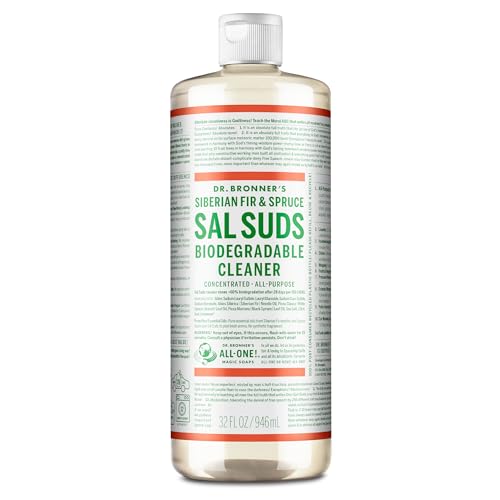
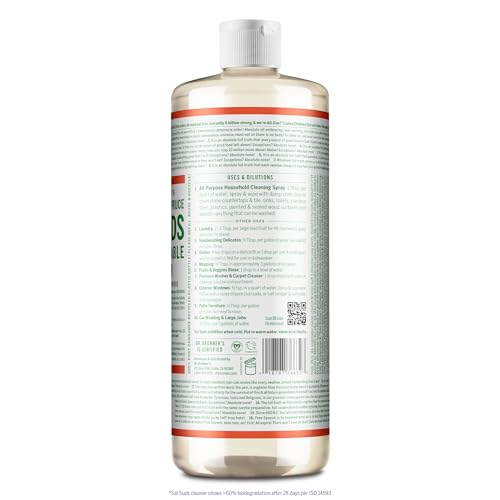
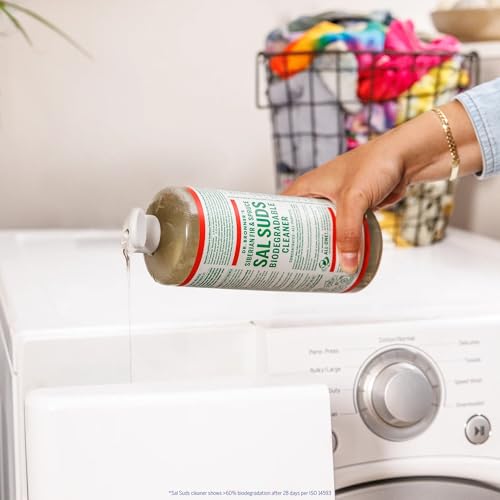
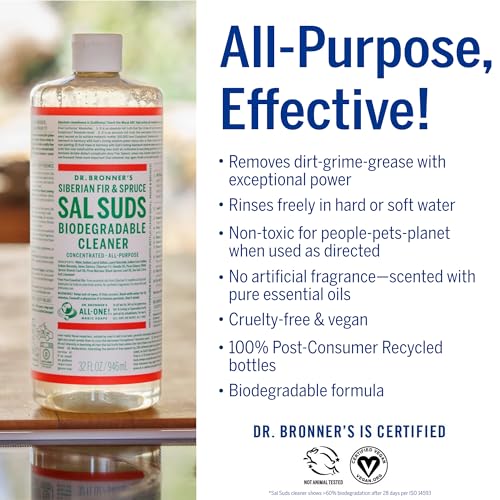
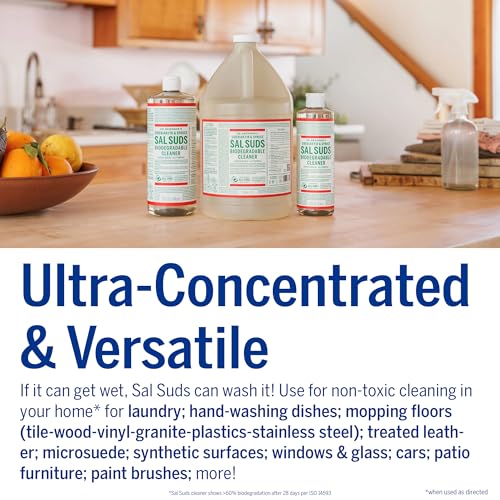
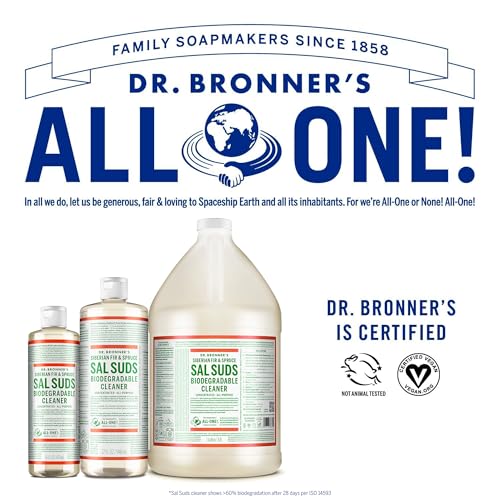
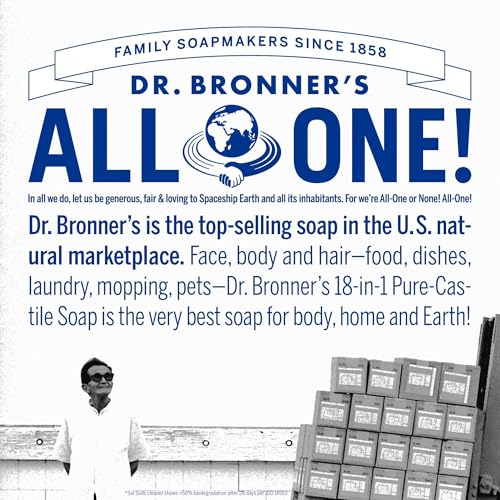
Dr. Bronner's Sal Suds Cleaner - Powerful Plant-Based Formula, Biodegradable, 32 oz


Cocamidopropyl Betaine
High RiskCocamidopropyl betaine is a synthetic surfactant derived from coconut oil, commonly used in personal care products for its mild cleansing and foaming properties. It functions as a surfactant, emulsifier, and thickening agent, contributing to the texture and performance of formulations.
Sustai Insights
Cocamidopropyl betaine offers functional benefits as a gentle surfactant, enhancing product foaming and texture. However, it may pose low to moderate allergenic risks and is subject to high use restrictions due to contamination concerns. Regulatory bodies have advised on its safe levels of usage, categorizing its risk level as high overall. Users should practice caution, particularly with sensitive populations, and consider alternatives like naturally derived surfactants for safer formulations.
Potassium Hydroxide
High RiskPotassium hydroxide is a caustic inorganic base commonly used in various products for its ability to adjust pH levels and act as a cleaning agent. It is highly soluble in water and can produce heat upon dissolution, making it effective in certain formulations.
Sustai Insights
Potassium hydroxide serves as a strong pH adjuster and cleaning agent, but it poses significant health risks due to its caustic nature, which can cause irritation to skin and eyes. Environmental concerns include its potential to contribute to water pollution. Regulatory bodies have imposed strict usage restrictions due to these hazards, leading to a high-risk overall assessment. Safe handling practices are essential, and alternatives such as citric acid may provide safer pH adjustment without the associated risks.
Citric Acid
Medium RiskCitric acid is an alpha hydroxy acid used in personal care products primarily for its role as a pH adjuster and natural preservative. It occurs naturally in citrus fruits and is commonly utilized in various formulations for its chelating properties and mild exfoliation benefits.
Sustai Insights
Citric acid offers functional benefits as an effective preservative and pH stabilizer, contributing to product longevity and stability. It is biodegradable and derived from renewable sources. Health risks are low, with minimal concerns regarding carcinogenicity, allergies, and reproductive toxicity. However, moderate use restrictions exist due to potential irritation at high concentrations. Environmental risks are limited, as citric acid is not known to accumulate in ecosystems. Regulatory agencies have no significant advisories against its use. Overall, it is assessed as a medium-risk ingredient, with safe usage practices recommended and alternatives available.
Sea Salt
Low RiskSea salt is a mixture of inorganic salts derived primarily from the evaporation of seawater. It consists mainly of sodium chloride, with minor amounts of other minerals. Sea salt is commonly used as a seasoning and preservative in food products and may also have applications in cosmetics and personal care items.
Sustai Insights
Sea salt serves as an effective flavor enhancer and preservative, contributing to the taste and shelf-life of food products. It is generally considered safe with low risk for health concerns such as cancer, allergies, and reproductive toxicity. Environmental impact is minimal, as it does not contribute significantly to pollution or bioaccumulation. Regulatory bodies, including the FDA, currently do not impose restrictions on its use. Overall, the risk level associated with sea salt is low, making it a widely accepted ingredient with no significant adverse effects reported.
Decyl Glucoside
Low RiskDecyl glucoside is a glucose-based surfactant derived from natural sources, primarily used as a mild cleansing agent in personal care products. It effectively reduces surface tension, allowing for improved mixing of ingredients and enhanced cleansing properties without stripping natural oils from the skin.
Sustai Insights
Decyl glucoside offers functional benefits as a non-ionic surfactant, making it suitable for sensitive skin formulations. It is biodegradable and derived from renewable resources, supporting sustainability. Health risks are primarily low, with minimal concerns regarding irritation and allergies. Environmental risks are low, as it does not significantly contribute to pollution or bioaccumulation. Regulatory status is generally favorable, with low restrictions noted. Overall, decyl glucoside presents a low risk for use in consumer products, making it a suitable choice for gentle formulations.
Sodium Sulfate
Low RiskSodium sulfate is an inorganic salt commonly used in various personal care products. It functions primarily as a bulking agent, helping to improve texture and stability. Sodium sulfate is often found in formulations for its ability to enhance the solubility of other ingredients.
Sustai Insights
Sodium sulfate presents functional benefits as a bulking agent, contributing to product consistency without significant health risks, as it is classified with low concerns for carcinogenicity, allergies, and developmental toxicity. There are no notable environmental hazards associated with its use, and it is not currently restricted by regulatory bodies such as the FDA. Overall, the risk level for sodium sulfate is considered low, making it a safe ingredient in personal care products. Alternatives are available but may not provide identical functional benefits.
Water
Low RiskWater is a clear, colorless liquid essential for various biological processes. It serves as a solvent in formulations, facilitating the dissolution of other ingredients and enhancing product texture and application. Additionally, water plays a crucial role in hydration and is a key component in many cosmetic and personal care products.
Sustai Insights
Water is an effective solvent and hydrator, contributing to the texture and efficacy of formulations. It is biodegradable and generally regarded as safe, with low concerns regarding carcinogenicity, allergies, and reproductive toxicity. However, excessive water usage can lead to environmental concerns, particularly regarding resource depletion. Regulatory bodies do not impose restrictions on water use in cosmetics. Overall, the risks associated with water are low, making it a safe and essential ingredient.
Abies (Fir) Oil
Low RiskAbies (fir) oil is an essential oil derived from fir trees, known for its aromatic properties and use in various cosmetic and personal care products. It functions primarily as a fragrance component and may also possess certain antimicrobial properties.
Sustai Insights
Abies (fir) oil offers functional benefits as a natural fragrance and potential antimicrobial agent, contributing to product appeal. It is generally recognized as having low health risks, with minimal concerns regarding carcinogenicity, allergies, or reproductive toxicity. Environmental risks are also low, with no significant pollutant potential or bioaccumulation. Regulatory status shows no current restrictions. For safe usage, it is advisable to follow standard guidelines. Overall, this ingredient carries a low risk profile, making it a favorable choice in formulation.
Sodium Lauryl Sulfate
Low RiskSodium lauryl sulfate is the sodium salt of lauryl sulfuric acid, commonly used as a surfactant in various personal care and cleaning products. It functions primarily to create lather and reduce surface tension, facilitating the distribution of other ingredients.
Sustai Insights
Sodium lauryl sulfate effectively serves as a surfactant, enhancing product performance in cleansing formulations. It is generally considered to have low health risks, with minimal concerns regarding carcinogenicity, allergy, or reproductive toxicity. Environmental impact is also low, as it is not classified as a bioaccumulative pollutant. Regulatory bodies, including the FDA, impose no significant restrictions on its use. Safe usage practices should still be observed to minimize skin irritation. Overall, sodium lauryl sulfate is assessed as low risk, with alternatives like sodium coco sulfate available for those seeking more sustainable options.
Sea Salt
Low RiskSea salt is a mixture of inorganic salts derived primarily from the evaporation of seawater. It consists mainly of sodium chloride, with minor amounts of other minerals. Sea salt is commonly used as a seasoning and preservative in food products and may also have applications in cosmetics and personal care items.
Sustai Insights
Sea salt serves as an effective flavor enhancer and preservative, contributing to the taste and shelf-life of food products. It is generally considered safe with low risk for health concerns such as cancer, allergies, and reproductive toxicity. Environmental impact is minimal, as it does not contribute significantly to pollution or bioaccumulation. Regulatory bodies, including the FDA, currently do not impose restrictions on its use. Overall, the risk level associated with sea salt is low, making it a widely accepted ingredient with no significant adverse effects reported.
Decyl Glucoside
Low RiskDecyl glucoside is a glucose-based surfactant derived from natural sources, primarily used as a mild cleansing agent in personal care products. It effectively reduces surface tension, allowing for improved mixing of ingredients and enhanced cleansing properties without stripping natural oils from the skin.
Sustai Insights
Decyl glucoside offers functional benefits as a non-ionic surfactant, making it suitable for sensitive skin formulations. It is biodegradable and derived from renewable resources, supporting sustainability. Health risks are primarily low, with minimal concerns regarding irritation and allergies. Environmental risks are low, as it does not significantly contribute to pollution or bioaccumulation. Regulatory status is generally favorable, with low restrictions noted. Overall, decyl glucoside presents a low risk for use in consumer products, making it a suitable choice for gentle formulations.
Sodium Sulfate
Low RiskSodium sulfate is an inorganic salt commonly used in various personal care products. It functions primarily as a bulking agent, helping to improve texture and stability. Sodium sulfate is often found in formulations for its ability to enhance the solubility of other ingredients.
Sustai Insights
Sodium sulfate presents functional benefits as a bulking agent, contributing to product consistency without significant health risks, as it is classified with low concerns for carcinogenicity, allergies, and developmental toxicity. There are no notable environmental hazards associated with its use, and it is not currently restricted by regulatory bodies such as the FDA. Overall, the risk level for sodium sulfate is considered low, making it a safe ingredient in personal care products. Alternatives are available but may not provide identical functional benefits.
Cocamidopropyl Betaine
High RiskCocamidopropyl betaine is a synthetic surfactant derived from coconut oil, commonly used in personal care products for its mild cleansing and foaming properties. It functions as a surfactant, emulsifier, and thickening agent, contributing to the texture and performance of formulations.
Sustai Insights
Cocamidopropyl betaine offers functional benefits as a gentle surfactant, enhancing product foaming and texture. However, it may pose low to moderate allergenic risks and is subject to high use restrictions due to contamination concerns. Regulatory bodies have advised on its safe levels of usage, categorizing its risk level as high overall. Users should practice caution, particularly with sensitive populations, and consider alternatives like naturally derived surfactants for safer formulations.
Water
Low RiskWater is a clear, colorless liquid essential for various biological processes. It serves as a solvent in formulations, facilitating the dissolution of other ingredients and enhancing product texture and application. Additionally, water plays a crucial role in hydration and is a key component in many cosmetic and personal care products.
Sustai Insights
Water is an effective solvent and hydrator, contributing to the texture and efficacy of formulations. It is biodegradable and generally regarded as safe, with low concerns regarding carcinogenicity, allergies, and reproductive toxicity. However, excessive water usage can lead to environmental concerns, particularly regarding resource depletion. Regulatory bodies do not impose restrictions on water use in cosmetics. Overall, the risks associated with water are low, making it a safe and essential ingredient.
Abies (Fir) Oil
Low RiskAbies (fir) oil is an essential oil derived from fir trees, known for its aromatic properties and use in various cosmetic and personal care products. It functions primarily as a fragrance component and may also possess certain antimicrobial properties.
Sustai Insights
Abies (fir) oil offers functional benefits as a natural fragrance and potential antimicrobial agent, contributing to product appeal. It is generally recognized as having low health risks, with minimal concerns regarding carcinogenicity, allergies, or reproductive toxicity. Environmental risks are also low, with no significant pollutant potential or bioaccumulation. Regulatory status shows no current restrictions. For safe usage, it is advisable to follow standard guidelines. Overall, this ingredient carries a low risk profile, making it a favorable choice in formulation.
Citric Acid
Medium RiskCitric acid is an alpha hydroxy acid used in personal care products primarily for its role as a pH adjuster and natural preservative. It occurs naturally in citrus fruits and is commonly utilized in various formulations for its chelating properties and mild exfoliation benefits.
Sustai Insights
Citric acid offers functional benefits as an effective preservative and pH stabilizer, contributing to product longevity and stability. It is biodegradable and derived from renewable sources. Health risks are low, with minimal concerns regarding carcinogenicity, allergies, and reproductive toxicity. However, moderate use restrictions exist due to potential irritation at high concentrations. Environmental risks are limited, as citric acid is not known to accumulate in ecosystems. Regulatory agencies have no significant advisories against its use. Overall, it is assessed as a medium-risk ingredient, with safe usage practices recommended and alternatives available.
Potassium Hydroxide
High RiskPotassium hydroxide is a caustic inorganic base commonly used in various products for its ability to adjust pH levels and act as a cleaning agent. It is highly soluble in water and can produce heat upon dissolution, making it effective in certain formulations.
Sustai Insights
Potassium hydroxide serves as a strong pH adjuster and cleaning agent, but it poses significant health risks due to its caustic nature, which can cause irritation to skin and eyes. Environmental concerns include its potential to contribute to water pollution. Regulatory bodies have imposed strict usage restrictions due to these hazards, leading to a high-risk overall assessment. Safe handling practices are essential, and alternatives such as citric acid may provide safer pH adjustment without the associated risks.
Sodium Lauryl Sulfate
Low RiskSodium lauryl sulfate is the sodium salt of lauryl sulfuric acid, commonly used as a surfactant in various personal care and cleaning products. It functions primarily to create lather and reduce surface tension, facilitating the distribution of other ingredients.
Sustai Insights
Sodium lauryl sulfate effectively serves as a surfactant, enhancing product performance in cleansing formulations. It is generally considered to have low health risks, with minimal concerns regarding carcinogenicity, allergy, or reproductive toxicity. Environmental impact is also low, as it is not classified as a bioaccumulative pollutant. Regulatory bodies, including the FDA, impose no significant restrictions on its use. Safe usage practices should still be observed to minimize skin irritation. Overall, sodium lauryl sulfate is assessed as low risk, with alternatives like sodium coco sulfate available for those seeking more sustainable options.
Experience the power of Dr. Bronner's Sal Suds Biodegradable Cleaner, a versatile all-purpose cleaner designed for eco-conscious consumers. This concentrated formula effectively tackles dirt, grease, and grime across various surfaces, from floors to laundry and dishes, all while being gentle on the planet.
- Powerful Cleaning Action: Ultra-concentrated formula cuts through tough dirt and grease, making cleaning effortless for any household task.
- Eco-Friendly Ingredients: Made with plant-based fir and spruce essential oils, this cleaner is free from synthetic dyes and fragrances, ensuring a safer clean.
- Sustainable Packaging: Packaged in 100% post-consumer recycled plastic, Dr. Bronner's reduces landfill waste and promotes recycling.
- Cruelty-Free Assurance: Certified cruelty-free by the Leaping Bunny logo, ensuring no animal testing is involved in any part of the product's lifecycle.
- Versatile Usage: Ideal for hard and soft water, this cleaner can be diluted for DIY recipes, offering flexibility for all cleaning needs.
Choose Dr. Bronner's Sal Suds for an effective, sustainable cleaning solution that aligns with your values.
Subscribe & Save with Sustai
- Best Price Guarantee: Always enjoy the lowest prices on sustainable home essentials.
- No Surprises: We’ll notify you before shipping. No hidden fees, ever.
- You’re in Charge: Change, pause, or cancel your subscription anytime with ease.
- Eco-Friendly Deliveries: Our grouped shipments mean less packaging and lower emissions.
Join us on a sustainable journey. Special offers for a limited time! Prices and promotions may change.
Recommended Products
Experience the power of Dr. Bronner's Sal Suds Biodegradable Cleaner, a versatile all-purpose cleaner designed for eco-conscious consumers. This concentrated formula effectively tackles dirt, grease, and grime across various surfaces, from floors to laundry and dishes, all while being gentle on the planet.
- Powerful Cleaning Action: Ultra-concentrated formula cuts through tough dirt and grease, making cleaning effortless for any household task.
- Eco-Friendly Ingredients: Made with plant-based fir and spruce essential oils, this cleaner is free from synthetic dyes and fragrances, ensuring a safer clean.
- Sustainable Packaging: Packaged in 100% post-consumer recycled plastic, Dr. Bronner's reduces landfill waste and promotes recycling.
- Cruelty-Free Assurance: Certified cruelty-free by the Leaping Bunny logo, ensuring no animal testing is involved in any part of the product's lifecycle.
- Versatile Usage: Ideal for hard and soft water, this cleaner can be diluted for DIY recipes, offering flexibility for all cleaning needs.
Choose Dr. Bronner's Sal Suds for an effective, sustainable cleaning solution that aligns with your values.

You can have at most 2 Sustainable Steals products in your cart
Customer Reviews
Customers’ View
Customers appreciate the cleaning power and eco-friendly qualities of the All-Purpose Cleaner. Many users highlight its effectiveness on various surfaces, including mirrors and laundry, with comments like, "It cleans everything and removes odors better." The pleasant pine scent is frequently mentioned, with customers noting it is natural and not overpowering. Furthermore, the product's plant-based ingredients and biodegradable formula resonate well with environmentally conscious consumers, who feel it reduces their chemical load. Users also comment on its longevity, with the concentrated formula lasting a long time, making it a cost-effective choice. Overall, this product is seen as a reliable and sustainable option for household cleaning needs.
AI-generated from the text of customer reviewsThis product has no reviews yet.




